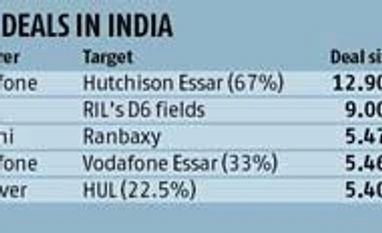The world’s second-largest consumer goods company will pay Rs 600 a share, a 21 per cent premium to Monday’s closing price. This is the fifth-largest in-bound investment in India after Vodafone, BP and Ranbaxy bought stakes in Indian companies (see chart).
Taken by surprise, investors bought HUL shares and the scrip shot up 17.28 per cent on BSE, adding Rs 18,550 crore to market capitalisation, to close at Rs 583.60 a share — within striking distance of the open offer price. It had a rub-off effect on other consumer stocks as well. The S&P BSE Fast Moving Consumer Goods Index rose as much as six per cent.
In a similar deal, the UK-based GlaxoSmithKline Plc had in November offered to buy a further 31.8 per cent stake in its Indian consumer products business for about $940 million. That offer ended up lifting the parent company’s stake to 72.5 per cent, just shy of its 75 per cent target.
James Allison, Unilever’s head of M&A, said the company had no plans to delist its shares from India and the offer price would not be raised. The offer, he said, was “fair” and would allow Unilever to capture more earnings from India.
Not everyone, however, was so enthused. Several market watchers said investors might be unwilling to part with their shares at the offer price, forcing Unilever to settle for a smaller stake or raise offer price. One of HUL’s large investors, Aberdeen said the premium offered by Unilever for HUL was not attractive enough, as the offer was based on a share price that had dramatically collapsed following the recent increase in royalties. Aberdeen Asset held four per cent in Hindustan Unilever as on March 31, data compiled by Bloomberg showed.
Minority shareholders, meanwhile, will remain fence sitters. Shriram Subramanian, founder of investment advisory firm, InGovern, said the offer price wasn’t much higher than the 52-week-high price or even the average of the past few months. “Besides, royalty concern continues to exist,” he added.
Unilever derives 52-53 per cent of its revenues from emerging markets, with countries like India, China and Indonesia being key drivers of growth.
Unilever’s offer values Hindustan Unilever at 37 times the subsidiary’s earnings before interest, taxes, depreciation and amortisation (Ebitda). According to data compiled by Bloomberg, the median multiple for similar deals was 10.8 times Ebitda.
)